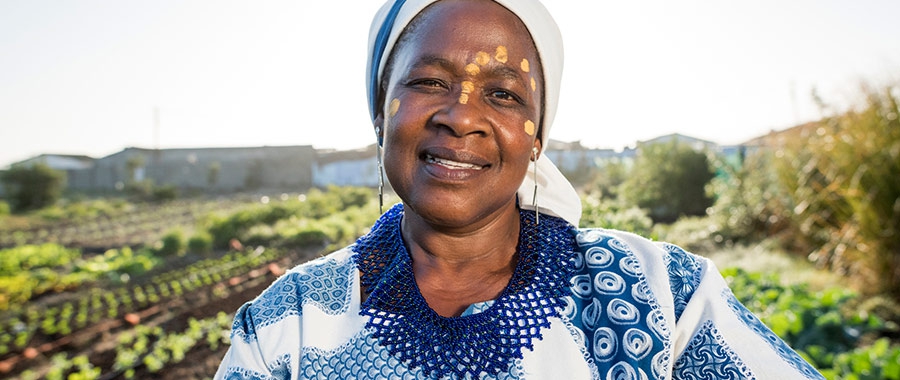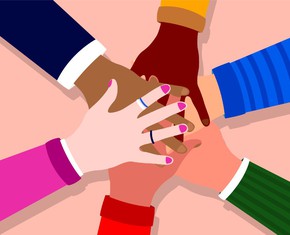The views expressed in our content reflect individual perspectives and do not represent the authoritative views of the Baha'i Faith.
For the resource-poor of the world, survival often depends on subsistence agriculture and/or small income-generating activities at home or in the local marketplace.
In many low-income countries, this kind of micro-entrepreneurship—rather than formal employment—creates an informal economy that comprises as much as 60-70% of the national economy.
Here’s the hard part: these small business people and subsistence entrepreneurs have little or no access to capital, which means they can’t expand their businesses and pull themselves and their families up out of poverty.
Credit at fair market rates can help. It provides a temporary substitute for family savings and catalyses a beginning spiral out of poverty towards economic self-sufficiency. With even minimal amounts of capital obtained through credit, the family invests in additional inputs, which increases productivity. This in turn raises family income.
 Micro-lenders like Grameen Bank , FINCA (the Foundation for International Community Assistance) and others have demonstrated that increased income, particularly in the hands of women, provides more consistent family nutrition, better health and surplus funds for savings and further investment. The spiral upward from poverty can begin.
Micro-lenders like Grameen Bank , FINCA (the Foundation for International Community Assistance) and others have demonstrated that increased income, particularly in the hands of women, provides more consistent family nutrition, better health and surplus funds for savings and further investment. The spiral upward from poverty can begin.
Beginning with very small loans of $50-100, with increasing lines of credit dependent upon how much a borrower has saved and reliably paid back, entrepreneurs enter a learning process at the same time they begin to build their own savings fund. The process can be relatively quick and effective. For instance, with short-term loans invested in rapid turn-over activities such as making and selling clothing, tools or crafts, borrowers have immediate income and savings for reinvestment. The learning curve is steeper and shorter than with longer-term loans. Income remains more consistent than with seasonal agricultural production alone, therefore family nutrition and health improve. The resource-poor can gradually spiral up out of poverty as they continue to apply the experience gained in the learning process.
The Link Between Spiritual Principles and Development
The founding spiritual principle behind the microfinance concept involves a deep belief in the inherent dignity of people: of the integrity, innate capacities and commitment of the majority of the world’s resource-poor to work hard, take responsibility for their own lives and to repay credit rather than depend on charity. From the universal principles of human dignity, trust, unity and the equality of women emerged practical measures that became the methodologies of successful microfinance programs worldwide. The Baha’i teachings emphasize this dignity and nobility, and remind those with financial means that the concerns of the poor are the concerns of everyone:
O Ye Rich Ones on Earth! The poor in your midst are My trust; guard ye My trust, and be not intent only on your own ease. – Baha’u’llah, The Hidden Words, p. 41.
O ye rich ones of the earth! Flee not from the face of the poor that lieth in the dust, nay rather befriend him and suffer him to recount the tale of the woes with which God’s inscrutable Decree hath caused him to be afflicted. By the righteousness of God! Whilst ye consort with him, the Concourse on high will be looking upon you, will be interceding for you, will be extolling your names and glorifying your action. – Baha’u’llah, Gleanings from the Writings of Baha’u’llah, pp. 314-315.
What I Have Learned About Poverty
I had the opportunity to volunteer for the Grameen Foundation, the “teaching arm” of Grameen Bank. The Grameen Foundation was originally set up to work with like-minded people and organizations to promote microfinance principles. While working there, I used my professional skills in developing processes and policies for internal audit and information technology. Through this volunteer work, I had the opportunity to talk with headquarters as well as field offices around the world.
I learned three important things about poverty:
- Poverty is not a choice. People do not choose to be impoverished. People would rather work to earn a decent livelihood.
- Ignoring poverty is a choice. If you do ignore it, it is a choice you have made.
- Poverty is about the lack of access to capital. Nearly 40 years of microfinance activities have proven this fact.
Microfinance efforts choose to look at poverty directly and work to eliminate the lack of access to capital.
What We Can Do About Poverty
In a recent letter about alleviating the extremes of poverty and wealth to the Baha’is of the world, the Universal House of Justice wrote:
Economic life is an arena for the expression of honesty, integrity, trustworthiness, generosity, and other qualities of the spirit. The individual is not merely a self-interested economic unit, striving to claim an ever-greater share of the world’s material resources. – The Universal House of Justice, To the Baha’is of the World, March 2017.
Microfinance efforts offer support for individuals to achieve that “expression of honesty, integrity, trustworthiness, generosity, and other qualities of the spirit.” These efforts look at individuals and their capacity as “not merely a self-interested economic unit, striving to claim an ever-greater share of the world’s material resources.”
The Baha’i teachings urge the poor to exert themselves and strive to earn the means of livelihood, and say that every person must have an occupation, a trade or a craft. Microfinance efforts assist poor people with developing those occupations, trades or crafts in order to earn the means of livelihood. We know from experience that financial services rather than hand-outs build nobility, dignity and capacity. We know that opportunities for women accelerate social and economic progress, and create ownership at the grassroots. We know that everyone has the right to a life free from abject poverty:
One of the most important principles of the Teaching of Baha’u’llah is: The right of every human being to the daily bread whereby they exist, or the equalization of the means of livelihood.
The arrangements of the circumstances of the people must be such that poverty shall disappear, that everyone, as far as possible, according to his rank and position, shall share in comfort and well-being. – Abdu’l-Baha, Paris Talks, p. 151.
















Comments
Sign in or create an account
Continue with Googleor